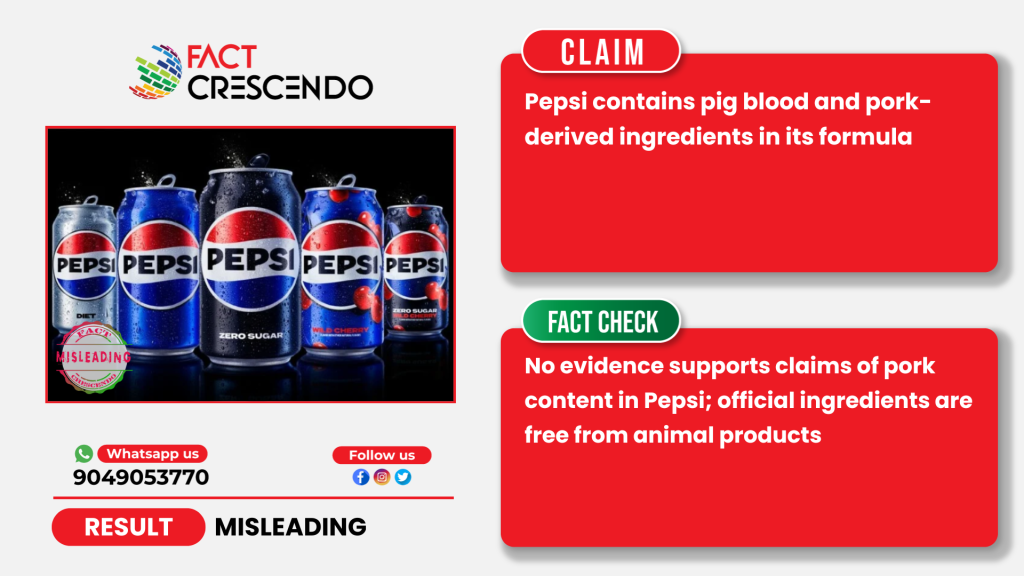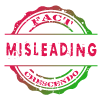
A widespread rumor has gained attention, especially among communities with dietary restrictions and health concerns, claiming that Pepsi, one of the world’s leading soft drink brands, contains pig blood and other pork-derived ingredients.
Social Media Posts
Questions about pork ingredients in Pepsi have emerged in various online discussions, with claims about pig blood and pork extract circulating widely on social media platforms like Facebook and X.
Due to the serious cultural, religious, and health implications of this claim, we conducted a fact-check on this
Fact-Check
Pepsi’s Ingredient Disclosure
PepsiCo provides a comprehensive ingredient glossary on their official website, detailing the components used in their beverages. The primary ingredients in Pepsi include carbonated water, sugar, caramel color, phosphoric acid, caffeine, citric acid, and natural flavors. There is no indication of any pig-derived substances in these ingredients. (Source)
While Pepsi’s ingredient list may vary slightly by region, its core components remain consistent. Here’s a breakdown of the main ingredients:
- Carbonated Water: Water infused with carbon dioxide under pressure to create the drink’s signature fizz.
- High Fructose Corn Syrup (HFCS): A corn starch-derived sweetener used primarily in the United States, while other countries use sucrose.
- Caramel Color (E150d): A food coloring made by heating sugar with acids or alkalis, giving Pepsi its dark color.
- Sugar: Regular sucrose is used as the main sweetener in regions that don’t use HFCS.
- Phosphoric Acid: Provides tanginess, preserves the drink, and balances its sweetness.
- Caffeine: A natural stimulant that adds slight bitterness and provides an energy boost.
- Citric Acid: Adds a subtle tart flavor to the beverage.
- Natural Flavors: A proprietary blend of natural flavoring agents that creates Pepsi’s distinctive taste.
(Source)
Suitability for Various Diets
According to official statements from PepsiCo and independent verification, regular Pepsi contains no animal-derived ingredients, making it suitable for vegetarians and vegans. The company maintains transparency about its ingredients through their product information portal and regulatory filings.
It should be noted that Diet Pepsi variants may contain certain ingredients that have not been fully disclosed or verified as vegan-friendly. This information is particularly relevant for consumers following specific dietary requirements or restrictions. The company recommends checking their website or contacting customer service for the most up-to-date ingredient information. (Source)
Health and Safety Regulations
The U.S. FDA maintains strict guidelines governing food and beverage ingredients. If any animal by-products such as blood or bone were used, they would require explicit disclosure—and no such disclosure exists for Pepsi. (Read more here)
Furthermore, we have reached out to PepsiCo for an official statement regarding these claims and are currently awaiting their response. We will update this article with any clarifications received.
Halal Considerations
While PepsiCo’s products do not carry halal or kosher certification, the company follows standard ingredient verification processes through supplier documentation. Their regular products are made without alcohol or pork-derived ingredients.
PepsiCo has confirmed through Halalguidance.com that their beverages are free from animal products. Their official website’s ingredient list also confirms the absence of alcohol in their products (Read more here).
Simply put, although Pepsi lacks formal halal or kosher certification, its products contain neither pork derivatives nor alcohol.
Conclusion
Upon our investigation, there is no evidence that Pepsi contains any pig blood or pork-derived ingredients. PepsiCo’s official ingredient list shows no animal products, and the company is transparent about what goes into their beverages through their quality control process.

Title: FACT-CHECKED: Does Pepsi Contain Pig Blood or Pork Ingredients?
Fact Check By: Cielito WangResult: Misleading


